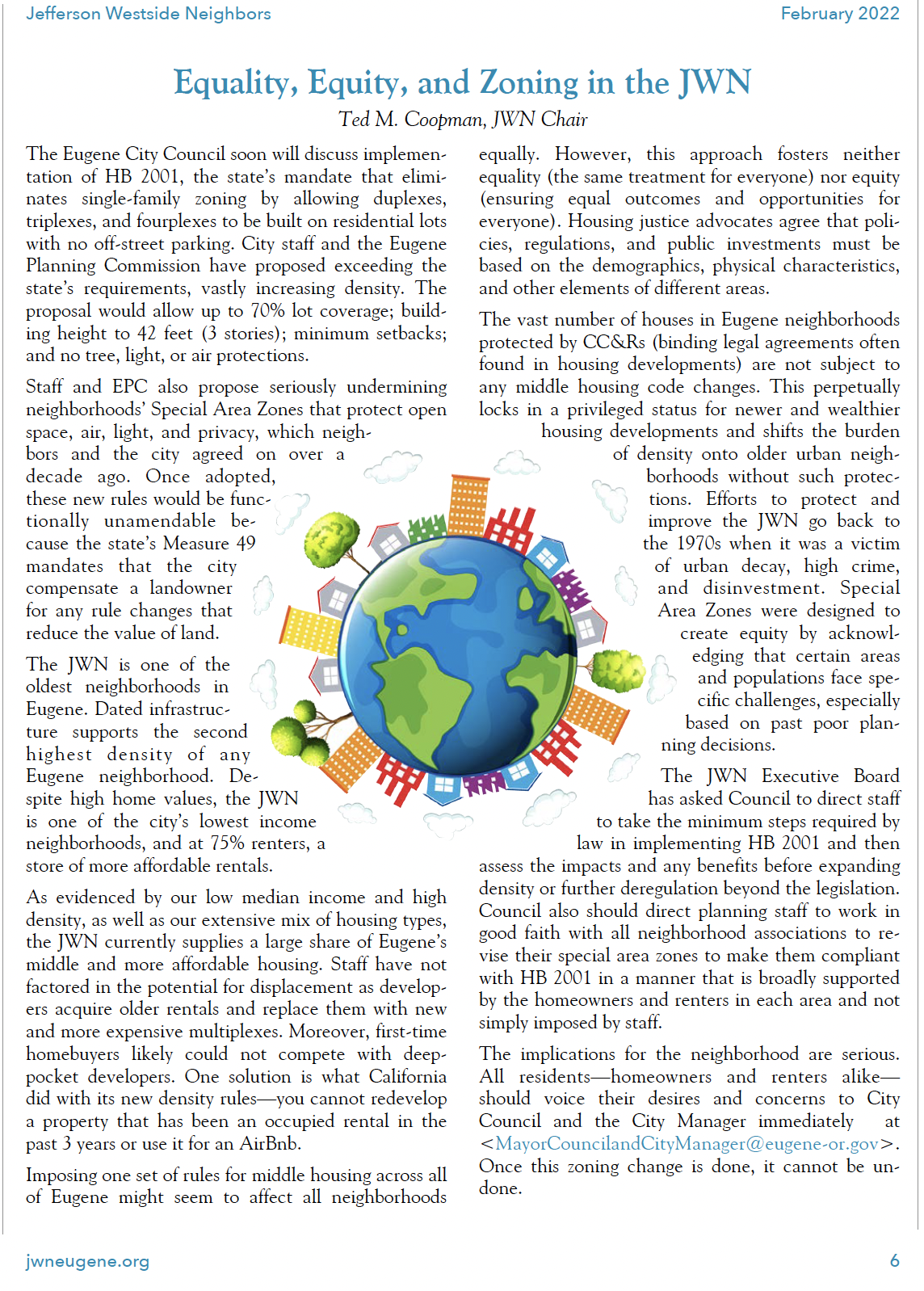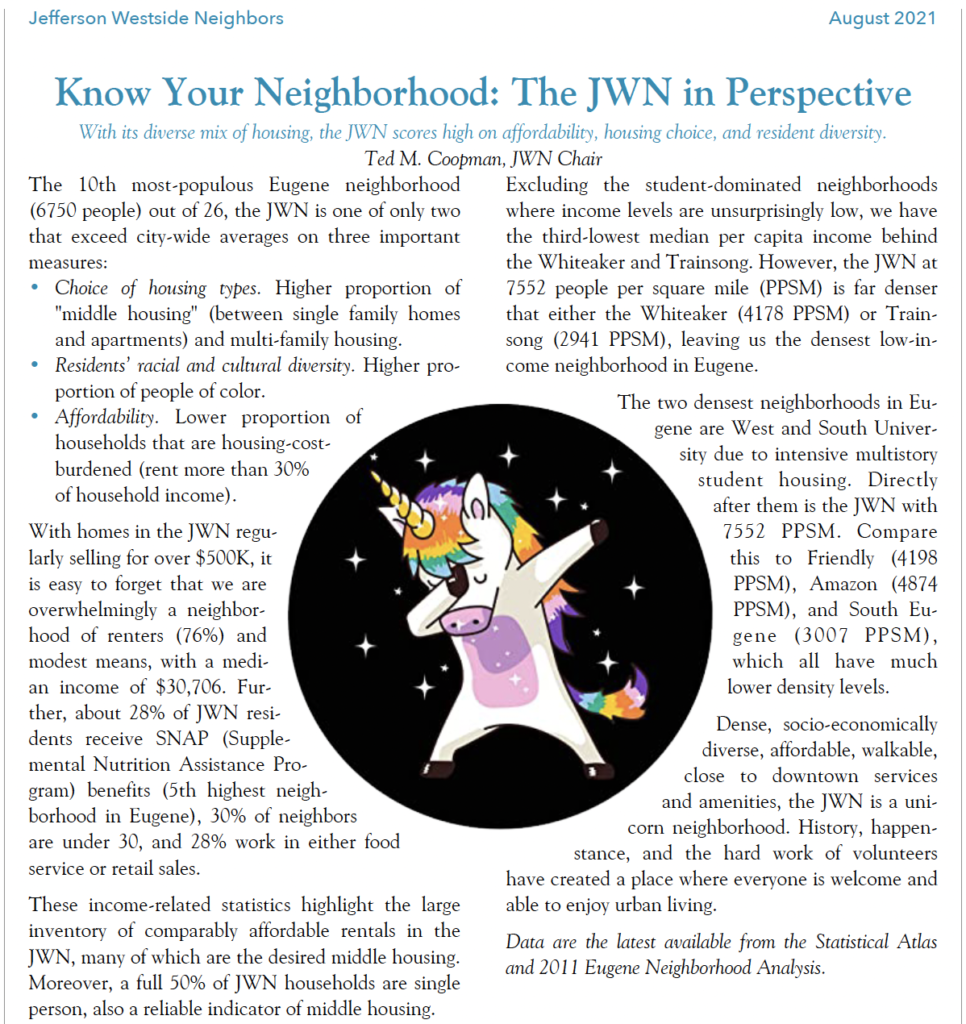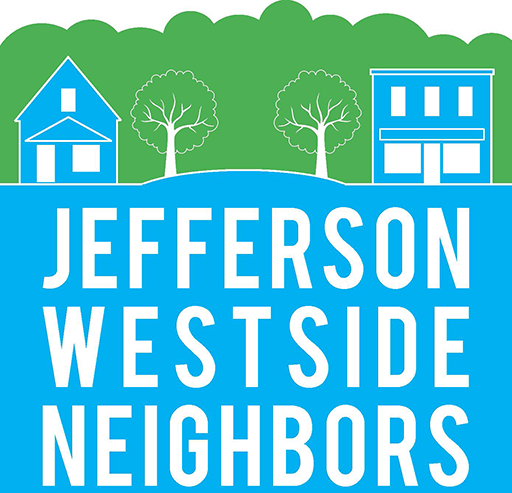See what the JWN has been up to in supporting affordable Housing:
Naval Reserve Site (13th and Chambers) Affordable Housing Project
Keystone Permanent Supportive Housing @ LEC (Home for Good), Safe Spots, other managed Shelters
On this page:
- Petition Supporting Housing and Climate Justice
- Slides and Recording on the January 2022 JWN General Meeting on HB 2001 and [NEW] the March 28 HB 2001 Info Session
- [NEW] Law of Unintended Consequences: Renter Protections and Hot Market Lead to Loss of Single Family House Rentals
- Equality, Equity, and Zoning in the JWN (Winter 2022 Newsletter)
- Know your Neighborhood: The JWN in Perspective
- JWN Executive Board February 2022 Letter to Eugene City Council on HB 2001 Implementation
- Former Vice Chair of Minneapolis Planning Commission on the Consequences of Upzoning (Minneapolis enacted an HB 2001-type ordinance in 2018)
- Update the required Housing Capacity Analysis first, then adopt the required Housing Production Strategy (HPS): Once we have that Data – then we can look at expanding beyond HB 2001
- Wednesday, May 11, Noon — Council work session on the HB 2001 code amendments.
- Wednesday, May 18, Noon — Council work session on the HB 2001 code amendments.
- Wednesday, May 23, 5:30 PM — Council work session, with a scheduled vote on HB 2001 code amendments
- Motion 1. Requiring affordability for all reductions of lot and development criteria beyond the requirements of HB 2001
- Motion 2. Requiring “Sufficient Infrastructure”
- Motion 3. Protecting “Goal Protected Lands”
- Motion 4. Limiting “Short-Term Rentals”
- Motion 5. Protecting “Naturally Occurring Affordable Housing.”
- Visit the City of Eugene Middle Housing Website
- For a detailed overview and critique of city staff’s proposed expansion of HB 2001 visit Housing-Facts.org.
Join 1300+ of your neighbors and sign a petition Supporting Housing and Climate Justice:
We, the undersigned Eugene residents and property owners respectfully request that the Eugene City Council take the following essential actions as part of the process to implement the requirements of HB 2001 in order to ensure that vulnerable households are protected and derive the greatest benefit from the State-mandated deregulation of residential zoning and that all aspects of the implementation fully support Eugene’s Climate Action Plan.
ACTIONS
- 1. As a first phase: To meet the June 30, 2022 deadline, amend the residential zones’ lot and development standards only to the degree that is necessary to conform to the State requirements.
- 2. Concurrent with adoption of the first set of amendments to conform with HB 2001, adopt additional zoning and other regulations to:
- a) Protect vulnerable households, particularly nonwhite and low-income households from displacement by demolitions, evictions, or increased rents because of gentrification; and
- b) Prevent development that would exacerbate climate change and/or environmental degradation.
- 3. Mail notices to all residents and owners of properties that would be subject to the code amendments and other regulations. The notices should clearly describe the significant proposed changes in lot and development standards and provide simple means for individuals to receive notice of all updates to the proposed code amendments and other regulations.
- 4. As second and subsequent phases: Adopt additional code amendments and other regulations that:
- a) Are based on completion of the HB 2003 required local assessment of future housing needs; and
- b) Require concrete community benefits, particularly provision of housing that is affordable to low-income households, for all additional code provisions that provide a “bonus” to developers by reducing the requirements for lot and development standards (e.g., smaller minimum lots sizes, reduced parking requirements, etc.); and
- c) Include protection and benefits based on area-specific considerations, particularly distinct residential neighborhoods or submarkets that have significant nonwhite or low-income households.
Take Action: Contact City Council: Send an email to Eugene Mayor, City Council, and City Manager at MayorCouncilandCityManager@eugene-or.gov
Slides and Recording on the January 2022 JWN General Meeting on HB 2001
PPT Slides in pdf from meeting: HB2001SlidesForJWNJan2022 v6
Topic: JWN January Meeting
Start Time: Jan 18, 2022 06:21 PM
Meeting Recording:
https://us06web.zoom.us/rec/share/YaDorB9vCBOLn5z0wtXvKLyohciGYMwQkLnSB7voj7pBDUyuNndHjZcH22f0XnMo.mlXE_0wArA8H2-QJ
Access Passcode: .^pw!M7&
Slides and Recording on the March 2022 Info Session on HB 2001
The JWN hosted an HB 2001 Implementation Zoom session on March 28 that drew 85 participants.
Paul Conte, a former JWN Chair who worked on the alternative proposal developed by neighborhood leaders covered some basics and answered questions.
We invited the Planning Division to send a staff person, and after initially saying yes, they backed out. Both Planning Director Alissa Hansen and City Manager Sarah Medary got involved and expressed concern about the format, insisting they were not comfortable sending out staff to engage the public outside of a traditional question and answer format with no opposing viewpoints. Our suggested format—with each panelist addressing specific elements of the proposed plan and the alternative plan, taking turns, no debate/cross talk, followed by Q&A—was apparently problematic.
Loss of Single Family Rentals
Winter 2022 Mailed Newsletter Article

Summer 2022 Mailed Newsletter Article

Unanimously adopted by the JWN Executive Board: A Letter Sent to Council on HB 2001 Implementation and Undermining JWN Special Area Zones
February 3, 2022
Re: HB 2001 Implementation
Dear City Councilors and Mayor,
The Jefferson Westside Neighbors Executive Board urges the Eugene City Council to reject the staff and Planning Commission proposal for the de facto elimination of our special area zones and all special area zones’ specific residential lot and development standards as part of the code amendments to implement HB 2001 for these reasons (discussed in detail below):
- A “one size fits no one” approach fails to create equality and fosters inequity.
- Perpetuates the injustice of privileging newer wealthier (Covenants, Conditions, and Restrictions (CC&R) protected neighborhoods at the expense of older poorer ones.
- Ignores Council’s support for special area zones and rationale on its opposition to HB 2001 concerning infrastructure and local control as well as its instructions to staff for minimum compliance on state land use mandates.
- Threatens to exacerbate gentrification and reduce inventory of affordable rentals and starter homes in high amenity neighborhoods.
- Threatens the loss of historic homes and mature tree canopy and resulting increased carbon production.
- Is irreversible or amendable due to Measure 49.
Staff and Planning Commission proposal to revert to the application of the R-1 and R-2 base zones for all residential areas designated Low or Medium Density Residential is misguided. The supposed rationale is that equal code standards (i.e., having identical text) for middle housing would produce equity (justice). The exact opposite would be the result. The clear consensus of housing justice advocates is housing justice requires certain policies. This includes regulations and public investments based on the demographics, physical characteristics, and other elements of different areas. More specifically, the city must manage areas vulnerable to gentrification and displacement especially carefully. Simply consider the different impacts the aggressive deregulation proposed for the HB 2001 code amendments would have on areas with restrictive CC&Rs (i.e., no impact) versus on areas in close-in neighborhoods with many rentals of older, more affordable houses.
Staff’s overreach in recommending a major change in elected officials’ long and consistently established policy supporting special area zones is wholly unnecessary. Staff’s proposed code amendments would in a single stroke subvert the will of Eugene residents as expressed and validated by City Council in the robust public process that created special area zones as well as the extensive Envision Eugene process. Special Area Zones were designed to create equity by acknowledging that certain areas and populations face specific challenges, particularly based on past problematic planning decisions (e.g., the well-documented up-zoning of the R-2 Zone from a “Two-Family Zone” to zoning standards that allowed substantially higher-intensity and destabilizing development without public notice or process).
The proposed elimination of standards based on the context and vulnerability of different residential areas under the “equality” banner ignores the need for equity to foster social justice. “Equal” treatment means each individual, group of people, or neighborhood is given the same rules, resources, and opportunities, regardless of their circumstances. As we learned in the city’s Belonging Training, so-called equal treatment can actually worsen inequity in communities because not every group or neighborhood needs the same resources or opportunities allocated to them in order to thrive. In contrast, equity requires meeting communities where they are and applying regulations and allocating resources and opportunities as needed to create reasonably equal outcomes for all community members. Attempting to apply the same middle housing standards in the JWN’s Special Area Zones undermines equity in these ways:
- Equity’s demand for meeting people where they are means honoring their perspectives and input into land use decisions. We accomplished this through a robust process with the people who would suffer the consequences of any land use decisions. Staff’s imposition of changes simply repeats the injustice of those who do not have to suffer the consequences making choices for those who do – the same injustice that led to the creation of our special area zones in the first place.
- The thousands (perhaps tens of thousands) of houses in those Eugene neighborhoods protected by CC&Rs are not subject to any middle housing code changes. This perpetually locks in a privileged status for newer and wealthier suburban housing developments and shifts the burden of density onto older urban neighborhoods without such protections. Further, to achieve true equality of outcomes, which staff claims to want, the protective rules mutually agreed to by neighborhoods with CC&Rs should be matched by respecting the regulations mutually agreed to by the city and neighborhoods with special area zones (and those university-area neighborhoods covered by “area-specific” standards). Just because legally, they are not required to, does not mean that morally they should.
- West Eugene (including the JWN and Whiteaker) has been historically subject to harmful decisions based on protecting/benefitting other areas of Eugene. These harms range from freeways and one-way streets in our residential neighborhoods to bearing the brunt of the homeless crisis. Eliminating special area zones furthers this discriminatory trend in housing.
- The burden of density and redevelopment historically has fallen on older and lower income neighborhoods. This is the case for the JWN, which has the third lowest median income of any Eugene neighborhood. Our special area zones were created to try and mitigate these inequities.
- As one of Eugene’s oldest neighborhoods, we have older infrastructure that already is burdened as we are the densest Eugene neighborhood outside the University District. How are we supposed to handle a massive increase in our density?
- As evidenced by our low median income and high density, as well as even a casual examination of our mix of housing types, the JWN already supplies a large share of middle and more affordable housing in Eugene. This is largely due to our inventory of older, marginal rental properties. These same properties would be prime targets for development into much more expensive market rate rentals. This sort of redevelopment gentrification would add to the already significant gentrification of owner-occupied homes.
- The least expensive homes provide opportunities for first-time home buyers. If our protections of our special area zones are lost, these first-time home buyers will have to compete with deep-pocketed developers. The potential for development will increase already high housing prices, pushing homeownership further away for many people. Home ownership is a primary avenue for building generational wealth and upward mobility. Elimination of older, more affordable single-family homes in favor of market rate multiplexes furthers the trend of creating a permanent class of renters instead of homeowners.
Preserve Historic Neighborhoods and Mitigate Climate Change
We would add that the JWN has a large inventory of historic homes and impressive old tree canopy (despite this, overall tree canopy coverage still lags behind more affluent neighborhoods). The history and character of Eugene is in no small part created by these amenities that benefit everyone. Demolishing and cutting down this legacy on the dubious grounds of increasing density would be a crime against our collective past and future mitigation of climate impacts that cannot be undone. The greenest house is one that already exists, and renovation creates a fraction of the carbon of new construction.
Remember why Council Strongly Opposed HB 2001
The JWN Executive Board wishes to remind current councilors that the City Council filed testimony in opposition to HB 2001 on the grounds it violated “home rule” for land use and undermined decades of infrastructure development that focused on increasing density on major transportation corridors. This as opposed to piecemeal infill. Further, Council directed staff to make the minimum changes required to implement the state’s land use mandates. Therefore, why would Council then accept the staff’s and the Eugene Planning Commission‘s inexplicable approach that goes far beyond complying with the Legislature’s already problematic development mandates and substantially amplify their negative impacts? Moreover, every special area zone was approved by both the Eugene Planning Commission and City Council – each one with a more robust and evidence-based process than has guided the current attempt at the wholesale elimination of this long-standing approach to housing equity.
We plead with Council to direct staff to take the minimum steps required by law in implementing HB 2001 – leaving in place existing code – and then wait to assess the impacts and any benefits before expanding density or further deregulation beyond what is required.
You can’t create housing by destroying it. Preservation of existing rental inventory and entry-level-homes should be a priority. As the Eugene-Springfield Consolidated Plan observes “The lack of affordable units is best addressed by continuing to add and preserve existing affordable rental and owner‐occupied housing” (p. 151). At a minimum, Council should adopt some iteration of the rules created by California in their own version on HB 2001(SB 9) – A proposed project cannot result in the demolition or alteration of affordable or rent-controlled housing or market-rate housing that has been occupied by a tenant in the past three years and prohibits use of any infill multiplexes as short-term rentals. As the Seattle Times (1/25/22) observed concerning Washington’s proposed version of HB 2001 “Unless lawmakers ensure that new middle housing would be affordable, HB 1782 looks less like an equalizer than a developer giveaway.” If this really all about creating affordable housing, then make that part of the code.
Council also should direct planning staff to work in good faith with all neighborhood associations to revise their special area zones to make them compliant with HB 2001 in a manner that is broadly supported by the homeowners and renters in each area and not simply imposed by staff.
Finally, the Council needs to be cognizant of Measure 49 claims. If Council adopts these extremely permissive staff proposals and those proposals have negative consequences as many have warned, there will be no practical way for reversal under Measure 49. The litigation and costs would be devastating. Better to take an incremental measured approach to find out what actually works than a foolish leap into the unknown.
Contact City Council: and let them know you support the Boards position. Send an email to Eugene Mayor, City Council, and City Manager at MayorCouncilandCityManager@eugene-or.gov
Minneapolis was the first city to adopt HB 2001 type ordinance in 2018 – Here are some of the Consequences
Former Minneapolis Planning Board Vice President Alissa Luepke Pier:
Don’t Put the Cart Before the Horse: Gather the Mandated Data First:
Another Reason for not Expanding on HB 2001
